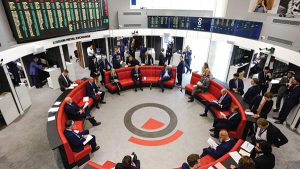Bloomberg
The London Metal Exchange (LME) suspended trading in its nickel market after an unprecedented price spike left brokers struggling to pay margin calls against unprofitable short positions, in a massive squeeze
that has embroiled the largest nickel producer as well as a major Chinese bank.
Nickel, used in stainless steel and electric-vehicle batteries, surged as much as 250% in two days to trade briefly above $100,000 a ton. The frenzied move — the largest-ever on the LME — came as investors and industrial users who had sold the metal scrambled to buy the contracts back after prices initially rallied on concerns about supplies from Russia.
The debacle will raise memories of the LME’s darkest period, the “Tin Crisis†of 1985, which saw the exchange suspend tin trading for four years and pushed many brokers out of business. That was driven by the collapse of the International Tin Council, a body backed by 22 governments that collapsed when it could no longer keep propping up the tin price.
“This is second only to the tin crisis,†said Malcolm Freeman, a broker at Kingdom Futures who began his career on the LME in 1974. “This was the right thing to do, and my gut feeling is that they’ll probably look at cancelling today’s trades too.â€
Traders, miners and processors often take short positions on the exchange as a hedge for their physical stocks of metal. In theory, any price moves in the physical stocks and the exchange position should cancel each other out. But when prices rise sharply, anyone holding a short position on the exchange needs to find ever-greater sums of collateral to pay margin calls.
Traders and brokers must deposit cash and securities, known as “margin,†on a regular basis to cover potential losses on their positions. If the market moves against those positions, they receive a “margin call†requesting further funds — and if they fail to pay, they can be forced to close their position.
 The Gulf Time Newspaper One of the finest business newspapers in the UAE brought to you by our professional writers and editors.
The Gulf Time Newspaper One of the finest business newspapers in the UAE brought to you by our professional writers and editors.
